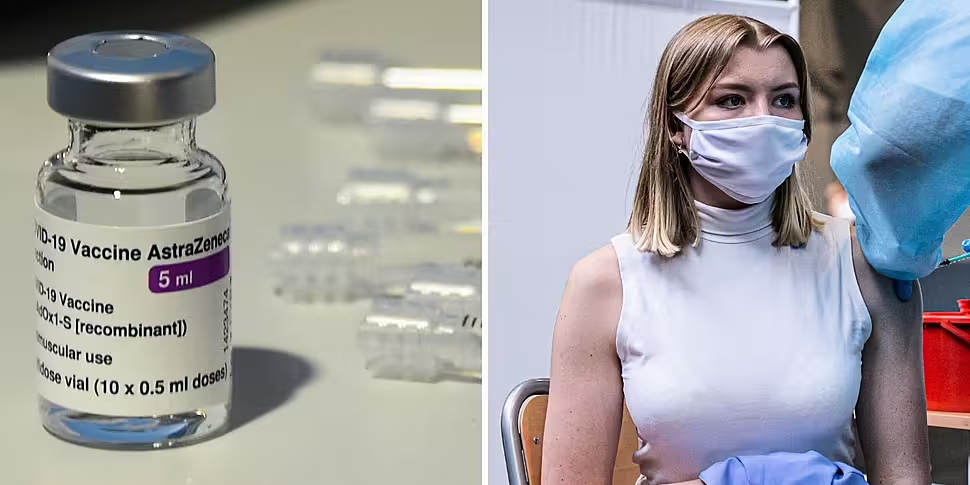Figures released last month showed that vaccine hesitancy is higher among young 18 to 34-year-olds than older age groups.
While demand for the Johnson & Johnson jab at pharmacies has been extremely high the figures suggest there are those in younger age groups with concerns over issues including health conditions and pregnancy.
The figures published by the Irish Pharmaceutical Healthcare Association (IPHA) showed that 11% of 18 to 24-year-old were unsure about taking the jab while 5% planned to refuse.
Among 25 to 34-year-olds, 7% were unsure and 13% planned to refuse.
This morning UCC Professor of Immunovirology Liam Fanning joined Newstalk Breakfast to answer listeners' questions about the four vaccines on offer.
Is there any up-to-date research on what vaccine would be best for a breastfeeding mother?
“The advice on that is to take any vaccine when you are offered,” said Professor Fanning.
“The mRNA vaccines (Pfizer and Moderna) would give you very good protection and also we know that the side effect profile from them in pregnant individuals is very low. From the American data we have seen that there are very little side effects at all from taking vaccines when breastfeeding or pregnant.”
I got my first Pfizer shot there four weeks ago and, at the time, there was a questionnaire I had to answer regarding medical conditions and allergies. I answered them all but I’m due to get my second shot tomorrow and I got another questionnaire with different questions. So, my question is, are there different ingredients in the first shot than there are in the second?
“No, they are exactly the same,” said Professor Fanning.
“The first shot and the second shot are exactly the same. Those questions are probably being asked out of an abundance of caution to make sure they haven’t missed anything that would be a counterindication of taking the vaccine – of which as you know there are very few.
“It’s possible the questionnaire has been reformulated or something like that. The questions are the same more or less.”
My daughter is 21. She doesn’t have any underlying conditions. She has read the WHO information saying there is no evidence to say it stops transmission. She believes it shouldn’t be offered to her age group. Can you convince her why she should take it?
“These vaccines have been shown to have different levels of protection against transmission,” said Professor Fanning.
“An individual who is vaccinated with an mRNA vaccine has 90% against acquiring this infection. The vector-based vaccines, which are the J&J and AstraZeneca have slightly less – they are around 60% protection against acquiring this infection, once fully immune after receiving your second shot.
“The advantage of being protected so highly from picking up this infection is it prevents you from passing it on to others. We do know that individuals who are vaccinated have a much lower viral load and are less likely to pass it on, but nonetheless, they can pass it on and nobody wants to pass it on to others.
“It gives very good protection against being infected.”
I have received a double AstraZeneca jab in the UK and I am back in Dublin now and I am being offered a Jansen (J&J). Because I am over 50, I am being offered a Jansen single shot. Are there any issues with taking that single shot? Will it improve efficacy or should I not take it?
“That is an extremely good immunological question,” said Professor Fanning.
“We do know that mixing the vector-based vaccines (AZ and J&J) with the mRNA vaccines (Pfizer and Moderna) gives you a very strong immunological response – in fact, better than two AstraZenecas.
“Mixing the two vector-based vaccines, there is very little data on that to date yet. From the AstraZeneca vaccine you have received you have very good coverage from hospitalisation and serious illness and from picking up this infection.
“The data supports getting the mRNA vaccines (Pfizer and Moderna) - in other words, a completely different vector delivery mechanism - for, in this case, the third shot.”
Is it possible that there will be serious long-term side effects from this vaccine? My main concern is that we don’t know what kind of serious health issues may crop up in the coming years.
“That is a very reasonable question,” said Professor Fanning.
“Just to give you some figures. In early June there were about 2.3 billion vaccines given globally.
“Vaccines historically have a very good track record of protecting against infection. Any symptoms tend to appear within the first week or two and some unusual ones tend to appear in the first month or two.
“So, there is no evidence to date to suggest that any of the vaccines that are currently being used in the COVID-19 vaccination programme generate any long-term side effects.”
I haven’t got a date for my second vaccine. My 28 days would have been on July 7th. Is it OK for me to go over my 28 days?
“I can answer this one. Yes, indeed it is,” said Ciara Kelly.









